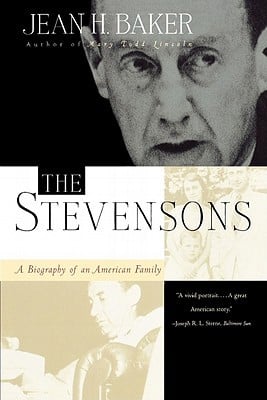“Madly for Adlai,” proclaimed the campaign buttons in 1952. But Adlai Ewing Stevenson II wasn’t the kind of politician who aroused mad affections, or, for that matter, hostilities. He was a Stevenson. Passion isn’t the Stevenson thing; service is—service conducted with objectivity and a certain fidelity to the public weal. Jean Baker, professor of history at Goucher College in Towson, Maryland, performs service higher than she may have imagined when she undertook this detailed examination of a major American political family. She produces tears of nostalgia and little quivers of affection for a time when dignity and politics lived peaceably beneath the same roof. To read this book is to realize anew how noxious and disgusting the political profession has become.
In Adlai Stevenson there was so little of raw ambition that it shocks. True, he confessed himself the victim of “a bad case of hereditary politics,” but this was only around the time he was considering a race for the governorship of Illinois, at the age of 47. Earlier, he had contemplated a race for the U.S. Senate, but lacked the drive to undertake it. There was always a tentativeness to the way the Stevensons sought political office. The first Adlai Ewing Stevenson—grandfather of the 20th-century presidential candidate—was surprised, the author writes, to achieve national prominence. He lacked strong belief in his own abilities, notwithstanding the moderate successes he enjoyed. “Perpetually available, irresistibly likable,” the ex-congressman became Grover Cleveland’s running mate in 1892 on the strength of his party loyalty, his Southern connections, and his pro-silver convictions. Supreme Court Justice David Davis, who knew him well, once endorsed him as a man “of large liberal and conservative views.”
Adlai II, on whom this large book justifiably centers, was himself a man of mixed convictions. He worked in the New Deal’s Agricultural Adjustment Administration, but without the reforming passion that drove so many New Dealers. A lawyer, socialite, and club man, he liked the idea of drifting back and forth between public and private affairs. He was the poorest excuse for an ideologue the Democrats have turned up in a half a century. His motive was to serve: to provide honest, public-spirited leadership. All right, so you might not want to follow where he led, but at least no interior vision drove him stumbling, shouting, back-stabbing through the political thickets.
The Democrats gave him their presidential nomination in 1952 despite his unwillingness to ask for it. He “entered the campaign,” Baker says, “with his benighted nineteenth-century notion intact that men must be chosen for office, not seek it.” The eloquence of his speeches falls charmingly on the ear in this, the year of that’s-what-it’s-all-about oratory. Here is one sample: “The road we travel is long, but at the end lies the grail of peace. And in the valley of peace we see the faint outlines of a new world; fertile and strong.” He was forever editing his “secular sermons.” “His texts,” observes Baker, “were the Bible, the Presbyterian Prayer Book, a Unitarian language absorbed in his childhood, and the evocative quotations gathered by friends and staff scribbled in a black notebook. His theme became a self-defined search for morality that he encouraged other Americans to join.” Tact was never his long suit. He informed the American Legion that he would “resist pressures from veterans . . . if I think their demands are excessive.”
Of course he lost. And may well have deserved to. But the way he lost continued to entrance true Stevensonians, like Eleanor Roosevelt. They nominated him again in 1956, with worse success than the time before. He was as eloquent as ever. “He observed more than he explained or solved.” He paid scant attention to blacks, women, and the poor. Eisenhower and Nixon ate him for lunch.
That was essentially it for Adlai II (though he served in the Kennedy administration as United Nations ambassador: a more consequential job than it has since become). Neither Jack Kennedy nor Lyndon Johnson—hard, practical, modern men—had much use for Stevenson and his flights of eloquence. Probably he would have made an average President at best. On the other hand, against the lurid backdrop of the 90’s, his civility and intelligence, not to say his sense of public spirit, make a larger impression than was the case when such characteristics were more widely taken for granted. Nor is this to overlook the discreet adultery that consoled him during an unhappy marriage which ended in divorce. At least he didn’t send state troopers on amatory errands.
Curiously, Baker’s extensively researched, well-written book, though theoretically concerned with politics, isn’t very revelatory about politics—the game or the causes that inspire the game. Social history is the professor’s bag. There is no large viewpoint here—almost no sense of the gigantic political forces at play during Stevenson’s heyday, such as New Deal radicalism, the unions, Goldwaterism, black-white tensions. At the same time, Baker bids us notice how the young Stevensons’ set in 1920’s Chicago disported themselves. Interesting, but not quite to the point.
Baker also has a fussy penchant for bringing up the maleness and whiteness of political audiences in an age when females and nonwhites barely figured in politics. Architecture too is a problem, given the author’s mission. The concluding chapters, dealing with Adlai III’s lusterless senatorial career, are sadly anticlimactic.
It’s a good book anyway, even a necessary one. We need these periodic reminders that things, politically speaking, don’t have to be as they are. If you never dreamed you could pine for Adlai Stevenson—why, you may just have misjudged.
[The Stevensons: A Biography of an American Family by Jean H. Baker (New York: W.W. Norton) 577 pp., $30.00]

Leave a Reply